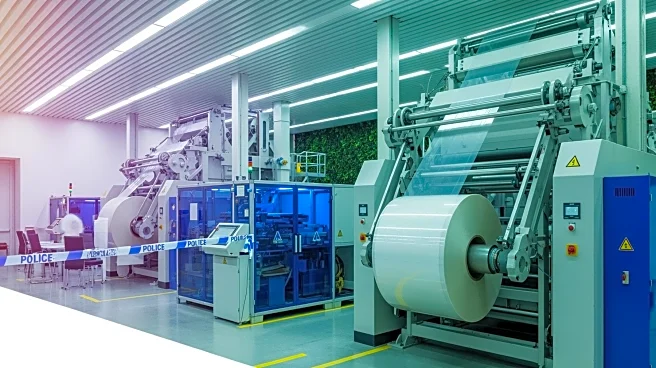What's Happening?
Endolys Ltd has announced plans to invest up to £120 million in establishing the UK's first large-scale plastic film recycling facility at the former Cleveland Bridge site in Darlington. The project aims to create up to 120 jobs and will involve the installation
of pyrolysis oil production units. The first phase of the development, which has already secured £60 million in funding, will process 60,000 tonnes of shredded plastic film waste into 40,000 tonnes of pyrolysis oil annually. A second phase, with similar investment, will double the processing capacity. The facility will source all waste from municipal waste facilities, and operations are expected to begin by the end of 2026, pending planning and environmental approvals.
Why It's Important?
This development is significant as it addresses the challenge of recycling plastic film, a material that currently lacks large-scale recycling facilities in the UK. The project not only promises to create high-quality jobs but also positions the region at the forefront of recycling innovation and clean growth. By converting plastic waste into pyrolysis oil, the facility contributes to reducing landfill waste and supports the transition to a circular economy. The initiative is expected to have a positive economic impact on the Teesside region, providing new opportunities and revitalizing the former Cleveland Bridge site.
What's Next?
The next steps involve securing the necessary planning and environmental approvals to commence the first phase of operations by the end of 2026. Stakeholders, including local government and community leaders, are likely to monitor the project's progress closely, given its potential economic and environmental benefits. The success of this facility could pave the way for similar projects across the UK, further advancing the country's recycling capabilities and sustainability goals.
Beyond the Headlines
The establishment of this facility highlights the growing importance of innovative recycling technologies like pyrolysis in addressing plastic waste challenges. It also underscores the need for continued investment in sustainable infrastructure to meet environmental targets. The project may inspire other regions to explore similar initiatives, contributing to a broader shift towards sustainable waste management practices.














